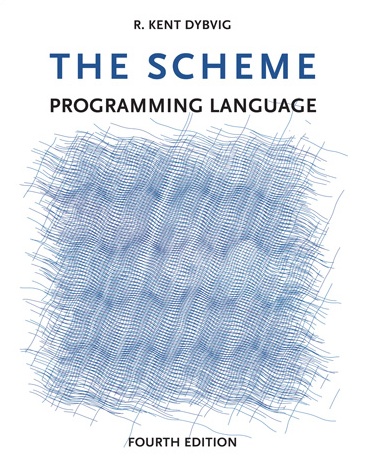

The Little Schemer, 4th edition
Daniel P. Friedman and Matthias Felleisen
The Scheme Programming Language, 4th edition
R. Kent Dybvig
If you don't understand interpreters, you can still write programs; you can even be a competent programmer. But you can't be a master.
—Hal Abelson, Professor of Electrical Engineering and Computer Science, MIT
This course explores the principles of programming language design through the study and implementation of computer programs called interpreters, which are programs that process other programs as input. A famous computer scientist once remarked that if you don't understand interpreters, you can still write programs, and you can even be a competent programmer, but you can't be a master. We will begin by studying functional programming using the strangely beautiful and very recursive programming language Scheme. After getting comfortable with Scheme and recursion, we will develop an interpreter for a Scheme-like language of our own design, gradually expanding its power in a step-by-step fashion. Along the way, we will become acquainted with lambda functions, environments, scoping mechanisms, continuations, lazy evaluation, nondeterministic programming, and other topics if time permits. We will use Scheme as our "meta-language" for exploring these issues in a precise, analytical way, similar to the way in which mathematics is used to describe phenomena in the natural sciences. Our great advantage over mathematics, however, is that we can test out our ideas about languages, expressed in the form of interpreters, by directly executing them on the computer.
Intermediate. No prior knowledge of Scheme is needed, but at least one semester of prior programming experience is expected.
Prof. Jim Marshall
Office: Ilchman Science Center 100
Phone: 2673 (from off campus: 914-395-2673)
Email: j + my last name + @sarahlawrence.edu
 |
 |
| REQUIRED The Little Schemer, 4th edition Daniel P. Friedman and Matthias Felleisen |
OPTIONAL The Scheme Programming Language, 4th edition R. Kent Dybvig |
On-time attendance is required and expected for all class meetings and conferences. Given the fast-paced, cumulative nature of the course material, students who miss class risk quickly falling behind, and catching up can be difficult. Although I realize that missing class sometimes cannot be avoided, your cumulative attendance record will will count as a significant part of your final course grade. If you are unable to attend class, please contact me about it as soon as possible. Special note: Everyone is required to attend our last class meeting on Thursday, December 12 — so plan accordingly. No student will be admitted to the course after the add/drop period ends.
I will often send out announcements to the class through email, so you are expected to check your Sarah Lawrence email account at least once per day. I will use your @gm.slc.edu address because it is reliable and easy to remember. You should also check the course web pages frequently for code examples discussed in lecture, and for the homework assignments. I will be happy to answer your questions by email and will try to respond as quickly as possible to messages that pertain to the course.
We will have many homework assignments this semester, usually one or two per week. This is to give you as much hands-on practice with the course concepts as possible, which is the only effective way to learn the material. Homework assigned on Tuesday will typically be due later that week on Thursday, whereas homework assigned on Thursday will be due the following Tuesday.
The homework assignments are the heart of the course. Most assignments will involve writing, testing, and debugging Scheme code. We will start out by writing many small, recursive programs in order to get the hang of recursive programming in Scheme. After we are comfortable with recursion, we will turn our attention to interpreters and the fundamental concepts of programming language design. You should expect to spend a substantial amount of time — several hours, at least — outside of class each week working on the assignments. Fortunately, programming is a lot of fun, and many students are surprised to find that they eagerly look forward to doing their programming assignments each week!
You will use a web-based submission system to turn in your Scheme files for each assignment. Please DO NOT email your homework to me. You should always include your name and the assignment number in a comment at the top of each file that you turn in. More details about using this system will be provided in class.
Start each assignment as early as possible. Don't wait until the day before it is due. "I can't get Scheme to work on my computer!" or "My computer crashed!" or "I accidentally deleted my files!" are not acceptable excuses for failing to complete an assignment on time. You should always make backup copies of your files to avoid this type of situation.
Homework assignments are evaluated on both the functionality and style of your code, according to the following rubric. To receive a ☆, your code must not only work perfectly, it must also be logically well-organized and easy to read.
| ☆ | Work of excellent quality that clearly meets or exceeds all of the assignment expectations. All programs work correctly on all of the input data, and are written in a clear, easy-to-read style. |
| ✓+ | Work of very good quality that meets most of the assignment expectations. Programs work correctly or mostly correctly for most of the input data, though some programs may have a few minor deficiencies or stylistic problems. |
| ✓ | Work of satisfactory quality that meets some of the assignment expectations and reflects a good effort overall, despite some deficiencies. Some programs work correctly or mostly correctly for most of the input data, but may have significant stylistic problems or other shortcomings. |
| ✓− | Work of subpar quality that falls short of assignment expectations and needs improvement. Some programs have serious deficiencies, and work incorrectly for a significant portion of the input data. Nevertheless, the work shows some degree of effort and understanding. |
| − | Work of poor quality that exhibits severe problems, reflecting minimal effort or understanding. Many programs crash or work incorrectly for most or all of the input data. |
At times you may find some of the course material to be quite daunting. But don't be discouraged! If you find it difficult, most likely so does the rest of the class. This is just a normal part of the process of learning to program. You are strongly encouraged to contact me as soon as possible whenever you are having difficulty with the material. You should also be sure to attend one (or even both) of the weekly group conference sessions, during which we will discuss whatever concepts students are having trouble with, and work on practice exercises together. In short, if you are confused about something, don't stay that way! Staying confused will only make things worse later. Contact me as soon as possible so that we can clear up the problem. There is no point in staring at the computer screen for hours trying to figure out why your code won't work, when just a few minutes is often all it takes to track down the problem together. I'll also be happy to answer questions over email or schedule a meeting with you on Zoom.
Do the reading before you come to class. Don't worry about total comprehension, but at least get a feel for what we will be covering. If you have some understanding of the material coming in, it will be easier for you to ask questions during class, rather than later, when I might not be available. Additionally, I will often discuss code examples in detail during class. If you have already done the assigned textbook reading, the examples will be much easier to follow.
Ask questions if you don't understand. This means both during class and while doing your homework. This course continually builds on previous material, so if you don't understand something one week, it will continue to be a problem the next week, and the week after that, and so on — until you finally do understand it. If you need help, contact me by email, ask me about it during class, or ask your classmates — but first read the Collaboration Policy below.
Start the homework assignments early. I realize this is not always easy to do, but if you can get into the habit of starting early, you will be much better off. Here are two reasons to start early: (1) if you get stuck, there will be time to ask for help before the deadline; (2) you can always walk away, go do something else (like sleep), and come back later. I find I always have at least a few new ideas when I come back in a fresh state of mind. If you wait until the last minute, you can't do this.
Practice, practice, practice. The only effective way to learn this material is to consistently do the homework assignments. Finish all of the assigned programs — and maybe even do some extra ones for fun! Even if you don't get them done on time, they will still help you learn the material.
Any student who feels they may need an accommodation based on the impact of a disability is encouraged to contact the Office of Access and Disability Services (ADS) to request reasonable accommodations. Email Kara Barrows, Assistant Dean of Access and Disability Services at disabilityservices@sarahlawrence.edu to begin the process or call 914-395-2235. Under the Americans with Disabilities Act and Section 504 of the Vocational Rehabilitation Act of 1973 all students with or without disabilities, are entitled to equal access to the programs and activities of Sarah Lawrence College.
The highest level of academic integrity is expected of every student. You are strongly encouraged to discuss ideas and approaches to solving problems on a general level with your fellow classmates, but you are not allowed to share your program files, code, or solutions with others, or to make use of another student's code or solutions obtained via email, the internet, or by any other means of communication. I can almost always tell when two different programs derive from the same original source code, even if cosmetic changes have been made to it. The code you hand in must have been written by you from scratch, with the following permitted exceptions: code provided in class by me, code from the textbook, or code developed together with a partner (and acknowledged specifically in a comment in the code) if you are collaborating on a homework assignment or project. In this case, you and your partner may freely exchange code developed as a team, and are jointly responsible for the work submitted. Under no circumstances may you hand in work under your own name that was done by someone other than yourself or your partner.
You are not allowed to use any type of chatbot (ChatGPT, Copilot, Colab AI, Gemini, etc.) or other code-generation system to help you write your code this semester. While these tools can be a great help if you already understand programming concepts and have considerable programming experience, they defeat the purpose of the learning process when you are just starting out.
In all cases, if you make use of any code that was written by someone else in your assignment, including your partner, you must clearly acknowledge this in your code. This also goes for any help obtained via the internet, including from StackOverflow or ChatGPT. Always credit the people or sources from whom you got help. If you are ever unsure about what constitutes acceptable collaboration, just ask. You are also responsible for carefully reading the College's official Policy on Academic Integrity in your SLC Student Handbook. Failure to abide by these rules is considered plagiarism, and will result in severe penalties, including possible failure in the course. Please do not put me, yourself, or anyone else in this unpleasant situation!
